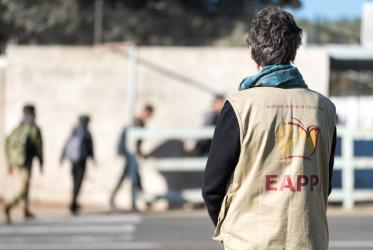By Anne Casparsson
This article is part of a series produced for the World Council of Churches olive harvest initiative, a global effort in 2020 to highlight the spiritual, economic and cultural importance of the olive harvest for Palestinian communities, and to witness to the impact of the occupation.
What does it mean to plant an olive tree? For people in the Holy Land, and in many other regions, this act of love bears deep cultural, spiritual, and economic meaning. In 2019, UNESCO established 26 November as World Olive Tree Day.
In the Holy Land, deep feelings for olive trees, held for generations, have brought forth organizations that bear witness to the importance of the olive harvest on many levels.
The Olive Tree Campaign of the Joint Advocacy Initiative, first launched in 2002, stands in solidarity with farmers and supports them to help keep hope alive. The project is supported by organizations, churches and individuals around the world.
Over the years, the Olive Tree Campaign has reached out to farmers, mostly in the area around Bethlehem and Hebron. As a Palestinian organization, The Olive Tree Campaign has no legal rights to protect people, or help the farmers to access their land. Especially in area C, often close to a checkpoint or a settlement, this can be challenging. Instead, the campaign focuses on helping with practical work linked to the harvesting, by planting olive trees and replanting trees that have been uprooted.
"What we are doing is spreading seeds of hope and we have many farmers needing our help. The olive tree in our society is a strong symbol for peace and resilience. It is very holy," says Hamzeh Abedrabbu, campaign coordinator for The Olive Tree Campaign.
The Joint Advocacy Initiative, working with different organizations, draws people internationally to help the farmers. Abedrabbu describes this as an enormous help for the farmers, who report that they are grateful that people around the world care about them.
"It is from the grassroots that change needs to develop. Spreading the word worldwide gives us hope and strength. We seek all the time to be transformative – in our flesh and in our words. We invite everybody that visits us from abroad, to sit under a tree. You can learn so much about our country, by touching an olive branch,” says Abedrabbu.
He owns olive trees himself, some of them on the other side of the wall, impossible for him to reach. He describes the enormous sadness of this fact.
"It is even hard to talk about it,” he says. "But it is the situation for so many Palestinians. We live under constant fear and sorrow. Every harvest season we face this fear and dilemma."
Hamzeh comes back to the spiritual value of the olive trees in their culture. How deep this feeling is among the Palestinians. This year, due to the pandemic, there have been more difficulties, more restrictions, less freedom of movement and no international presence. But in spite of this, people are trying to keep hope alive.
"Planting a tree for a farmer is like saying: You still exist. This is still your land. When we replant, we do not only plant a new tree. We rebuild something that has been broken. The farmers feel our compassion, and that gives them the energy to keep working.”
Learn more about the WCC olive harvest initiative 2020
In Palestine, “God honored this olive tree” (WCC press release of 12 November 2020)
“Your life is in peace when you collect the olives" (WCC press release of 29 October 2020)
*Anne Casparsson is a freelance journalist who focuses on justice and peace.








